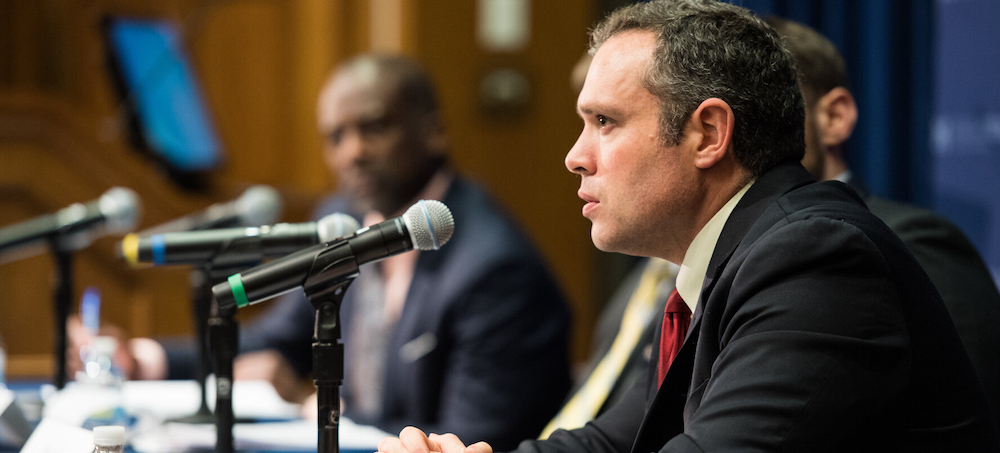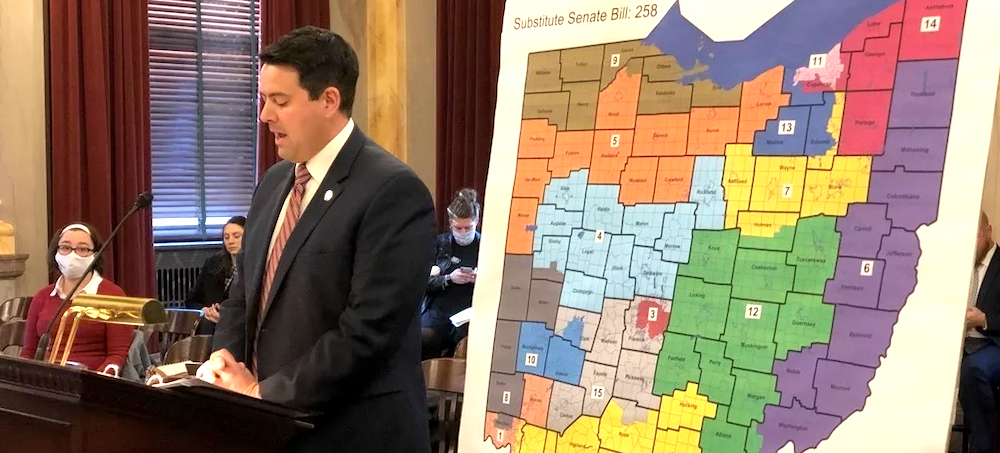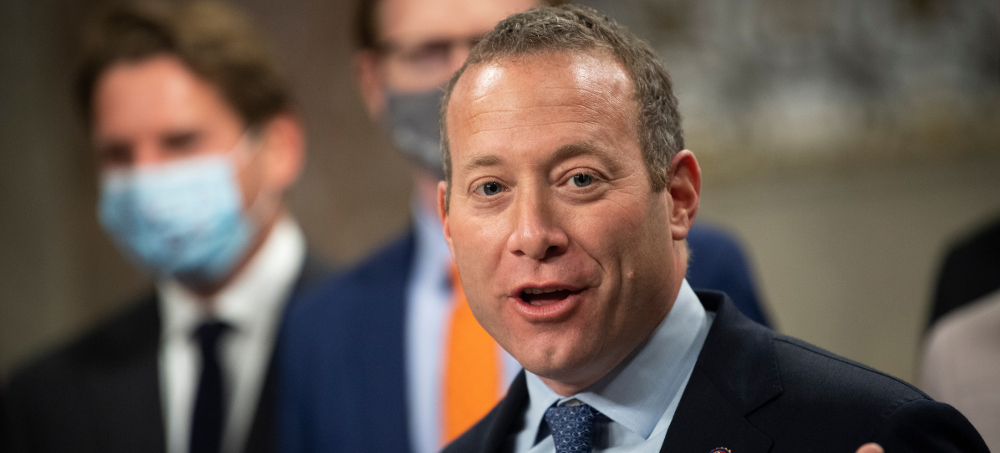Live on the homepage now!
Reader Supported News
Sens. Elizabeth Warren, (D-Mass.), Bernie Sanders (I-Vt), and Tammy Baldwin (D-Wisc.) sent a letter to two firms, Apollo Global Management and Blackstone, which previously owned Warrior Met Coal. In six-page letters to the firms, the senators also ask for details regarding the time their companies were invested in the coal company.
At issue are decisions they say that kept the company alive yet stripped miners of pay and benefits while eventually paying more than $1 billion in dividends to shareholders.
“While workers endured severe cuts to pay and benefits after the Warrior Met takeover, Apollo and the rest of the private equity consortium appear to have made off like bandits,” one of the letters reads.
Members of the United Mine Workers of America began a strike against Warrior Met Coal on April 1, citing concessions they say were made as Warrior Met emerged from the bankruptcy proceedings of the former Walter Energy, which declared bankruptcy in 2016. Union members contend they made numerous concessions in pay, benefits, holidays, overtime and in other areas to keep the company going and get it out of bankruptcy.
Union members have twice picketed the New York offices of BlackRock, an investment management corporation that is the world’s largest asset manager, not to be confused with Blackstone.
The senators said they have been concerned that “some private equity firms pursue strategies that extract value from portfolio companies at the expense of workers and communities.”
According to the lawmakers, Warrior Met returned at least $1.4 billion in dividends since the company went public in 2017, including nearly $800 million special cash distributions in 2017 alone, funded in part through debt. Within two years, Apollo, Blackstone, and the other private equity firms that had owned Warrior Met sold their shares, the senators said.
“These strategies include loading debt onto companies to fund payouts for the private equity firm and its executives, engaging in severe cost-cutting measures that harm workers and consumers, and quickly cashing out after extracting as much value as they can,” the letter states.
 Maj. Ian Fishback. (photo: NYT)
Maj. Ian Fishback. (photo: NYT)
Maj. Ian Fishback of Newberry, Michigan, died suddenly Nov. 19, according to his obituary from the Beaulieu Funeral Home in Newberry. He was 42. No cause of death was listed.
Fishback’s family says he died in an adult foster care facility in Michigan, The New York Times reported Tuesday.
Fishback wrote about the abuses in a letter to top aides of Sen. John McCain of Arizona and Sen. John W. Warner of Virginia, according to the newspaper.
McCain and Warner were senior Republicans on the Senate Armed Services Committee. Warner was the committee’s chair.
Fishback and two other former members of the 82nd Airborne Division reported that prisoners in Afghanistan and Iraq were assaulted, exposed to extreme temperatures, stacked in human pyramids and deprived of sleep in an effort to extract intelligence from them, or just to amuse the soldiers, The Times reported.
Fishback also said Army superiors ignored his complaints.
“Despite my efforts, I have been unable to get clear, consistent answers from my leadership about what constitutes lawful and humane treatment of detainees,” Fishback wrote in the letter to McCain. “I am certain that this confusion contributed to a wide range of abuses including death threats, beatings, broken bones, murder, exposure to elements, extreme forced physical exertion, hostage-taking, stripping, sleep deprivation and degrading treatment. I and troops under my command witnessed some of these abuses in both Afghanistan and Iraq.”
The allegations of abuse eventually led the U.S. Senate to approve anti-torture legislation in 2005.
Fishback’s family said in a statement on the funeral home’s website that the community had supported him “through his recent difficult times.”
“He faced many challenges and many of us felt helpless,” the family wrote. “We tried to get him the help he needed. It appears the system failed him utterly and tragically. There are many questions surrounding his death and the official cause of death is unknown at this time. We can assure you that we will get to the bottom of this. We will seek justice for Ian, because justice is what mattered most to him.”
The Associated Press left a message Wednesday seeking further comment from the family.
Fishback was named by TIME magazine as one of the 100 most influential people in the world in 2006 after sending his letter to McCain.
Friends and family were scheduled to gather at 1 p.m. Saturday to honor Fishback’s life at American Legion Post #74 in Newberry. The U.S. Army Honor Guard will conclude the services, according to his obituary.
Newberry is in Michigan’s Upper Peninsula.
 "U.S., NATO and Ukrainian officials have raised the alarm in recent weeks over what they say are unusual Russian troop movements closer to Ukraine." (photo: Sergey Volskiy/AFP/Getty Images)
"U.S., NATO and Ukrainian officials have raised the alarm in recent weeks over what they say are unusual Russian troop movements closer to Ukraine." (photo: Sergey Volskiy/AFP/Getty Images)
"As you can appreciate, all options are on the table and there's a toolkit that includes a whole range of options," Assistant Secretary of State for European and Eurasian Affairs Karen Donfried told reporters in a telephone briefing.
U.S. President Joe Biden said he was concerned about the situation in Ukraine, repeated Washington's support for Ukraine's territorial integrity and added that he will "in all probability" speak with his Ukrainian and Russian counterparts Volodymyr Zelenskiy and Vladimir Putin.
The comments came as U.S. Secretary of State Antony Blinken is heading to Latvia and Sweden next week to attend meetings of NATO and the Organization for Security and Cooperation in Europe (OSCE). Donfried said Moscow's "large and unusual" troop buildup would top the agenda at the NATO summit.
"It's now for the alliance to decide what are the next moves that NATO wants to take," Donfried said. "Next week, we will talk about our assessment of what's happening on Russia's border with Ukraine and we will begin that conversation of what are the options that are on the table and what it is that NATO as an alliance would like to do together," she said.
U.S., NATO and Ukrainian officials have raised the alarm in recent weeks over what they say are unusual Russian troop movements closer to Ukraine, suggesting that Moscow may be poised to launch an attack on its neighbor, accusations Russia has rejected as fear-mongering.
Asked if Blinken was going to meet with Russian Foreign Minister Sergei Lavrov while in Stockholm, Donfried said she had no such announcements to make but added: "Stay tuned."
On Friday, U.S. National Security Advisor Jake Sullivan and Ukraine's head of presidential administration, Andriy Yermak, in a call spoke about their concerns over Russian military activities near Ukraine's border.
The two discussed Russia's "harsh rhetoric" toward Ukraine and agreed all sides should pursue diplomatic efforts to ease tensions, National Security Council spokesperson Emily Horne said in a statement. "Mr. Sullivan underscored the United States' unwavering commitment to Ukraine's sovereignty and territorial integrity," Horne said.
The head of Ukraine's military intelligence told the Military Times outlet this weekend that Russia had more than 92,000 troops massed around Ukraine's borders and was preparing for an attack by the end of January or beginning of February.
Moscow has dismissed such suggestions as inflammatory and said it was not threatening anyone and defended its right to deploy its troops as it wished.
Donfried was asked what the United States saw specifically different in Russia's troop buildup this time, but she did not elaborate aside from saying it was "large and unusual."
Russia's intentions remain unclear, and East-West tensions are running high with Ukraine, Russia and NATO all conducting military drills and Moscow accusing Washington of rehearsing a nuclear attack on Russia earlier this month.
Asked if recent escalation has prompted Washington to consider more seriously deploying permanent troops in NATO's eastern flank, Donfried did not elaborate on the specific point but said NATO foreign ministers next week would be discussing the wider strategy for the alliance's posturing in the 21st century.
At the OSCE meeting in Stockholm, Donfried said, Blinken will also raise Russia's occupation of Ukrainian and Georgian territories, the conflict in Nagorno-Karabakh and the crisis in Belarus.
 Kyrsten Sinema and Joe Manchin. (photo: Stefani Reynolds/NYT)
Kyrsten Sinema and Joe Manchin. (photo: Stefani Reynolds/NYT)
GOP Rep. Jim Jordan told "FOX & Friends" on Friday morning that he is rooting for Democratic Sens. Joe Manchin and Kyrsten Sinema to "hold firm" in their opposition to President Biden's "Build Back Better" budget bill.
So let's hope this thing doesn't pass because it'll make matters worse. And right now, the country gets it – 71 percent of the country thinks we're on the wrong track. In my time in politics, I don't know if I've ever seen wrong-track numbers that high. Frankly, the real question is, who are the 29 percent who think we're on the right track? So let's hope it doesn't pass, and no Republican is going to vote for this crazy bill.
READ MORE Republican state Sen. Rob McColley presents a new congressional district map, drawn by the Senate Republican Caucus. (photo: Andy Chow/Ohio Public Radio)
Republican state Sen. Rob McColley presents a new congressional district map, drawn by the Senate Republican Caucus. (photo: Andy Chow/Ohio Public Radio)
The plan has 12 seats that either heavily favor or lean in favor of Republicans. That's 80% of the districts in a state that voted for former President Donald Trump with 53% of the vote in 2020.
Voter rights groups say Republican lawmakers went out of their way to carve the map in a way that gives them an advantage.
"It is full of weird shapes and squiggly lines," says Jen Miller, executive director of the League of Women Voters of Ohio. "Maps don't look like this unless you're trying to secure a partisan outcome rather than fairly representing voters."
Republicans defended the districts saying that they keep most of Ohio's largest cities whole and split fewer counties than the districts drawn 10 years ago.
There are six districts where the margin between Republican voters and Democratic voters is less than 10%. But of those six districts, five still lean in favor of the GOP.
"I don't think we should go into any map-making process and say, 'Okay, we have to have seven that are guaranteed to be one party and eight guaranteed to be the other party,' " says Republican State Sen. Rob McColley. "I don't think that's what the voters wanted."
2018 Ohio redistricting reforms
State lawmakers created the map under a new process approved by Ohio voters in 2018. The change was part of a movement to reform redistricting and prevent gerrymandering. A provision in the state constitutional amendment says leaders could not draw a map that "unduly favors or disfavors a political party or its incumbents."
Democratic State Rep. Stephanie Howse from Cleveland chided Republicans in a heated floor debate, saying this map ignores the will of the voters.
"That is not what people voted for in May of 2018. They deserve better. We need to do better. And we need to absolutely vote this mess down," Howse said.
In the same debate, Republican state Rep. Bill Seitz from Cincinnati said Ohio has been trending red and that elections depend on any given candidate.
" 'Fair', ladies and gentlemen, is in the eyes of the beholder," Seitz said. "We have followed the Constitution. We have done our duty. We have listened to the people. Listening to them does not mean agreeing with them."
The result of the new map could have national implications. It takes a state that previously had 12 Republican and four Democratic delegates and potentially tips the scales of power in the U.S. House of Representatives by eliminating two safe Democratic seats and creating a possible 13th district that's winnable for the GOP.
Ohio has become the latest state to finalize a new map. Democrats in states such as Illinois and Maryland have been criticized for proposing maps that favor their party. But the new maps around the country have, so far, resulted in more safe districts for Republicans.
Since the Ohio map did not get bipartisan support from Democrats, it will only be in place for four years, instead of the regular 10-year span, another provision of the 2018 redistricting reforms.
And advocates say they're not going down without a fight.
"This map is unconstitutional because it slices and dices communities purely to unduly favor one political party," says Miller.
The National Redistricting Action Fund, an affiliate of the National Democratic Redistricting Committee, filed a challenge in the Ohio Supreme Court saying the new map violates the state Constitution.
 Honduran presidential candidate for the Libertad y Refundacion (LIBRE) party Xiomara Castro de Zelaya delivers a speech during a rally in Santa Barbara, Honduras, November 14, 2021. (photo: Orlando Sierra/AFP/Getty Images)
Honduran presidential candidate for the Libertad y Refundacion (LIBRE) party Xiomara Castro de Zelaya delivers a speech during a rally in Santa Barbara, Honduras, November 14, 2021. (photo: Orlando Sierra/AFP/Getty Images)
Days before the elections in Honduras, many living outside the country worry they won’t be allowed to cast their ballots on November 28.
President Juan Orlando Hernández—implicated in his brother’s drug trafficking conviction by the Southern District Court of New York, and whose reelection in 2017 is considered by many to have been fraudulent—will be leaving office after eight years in power. Now, the opposition party Libertad y Refundación (Freedom and Refounding), known as "Libre," is vying for a comeback.
In a country of about 9.5 million, at least 746,000 Honduran citizens were living in the United States, according to the 2019 U.S. Census. This year, it’s possible that fewer than 13,000 of them will be able to vote in the upcoming elections because they don’t have up-to-date National Identification Cards. The old cards expired on November 15, and passports don’t constitute sufficient documentation, according to the National Registry of Persons and the National Elections Council.
For the first time since the coup, these elections represent the opportunity to challenge the National Party’s rule, which is widely regarded as a “narco-dictatorship” due to the many connections between the ruling and business elite and drug traffickers. Hondurans are eager for new leadership that will focus on providing for the people, rather than putting money in their own pockets.
On this Sunday’s ballot, Libre presidential candidate Xioamara Castro, the wife of ousted President Manuel Zelaya, is facing off against the National Party candidate Nasry Asfura, a two-time mayor of the country’s capital Tegucigalpa, who has been implicated in large-scale drug-trafficking schemes. A late October poll had Castro in the lead over Asfura by 17 points.
Voting Challenges for Hondurans in the Diaspora
Hondurans living abroad in the “19th Department,” a term used to refer to the entire diaspora, can’t apply for a National Identification Card at their local consulates because the ID cards are administered by a different agency, the National Registry of Persons. When the Registry came to the United States in June, they enrolled just under 13,000 people. Those people then had to wait months, for no stated reason, before their documents would be given to them.
Since the start of 2020, Juan Flores, a Honduran activist in Florida and founder of the nonprofit Fundación 15 de Septiembre, has been fighting for the right to vote for himself and his fellow countrymen abroad.
“We were excited that there was going to be enrollment abroad, and we’d be automatically able to vote,” he said in a phone interview. At that time he didn’t realize the enrollment would be so limited. Now, Flores said, “we feel we are being completely tricked by the Honduran authorities.”
Lucy Pagoda Quesada, the coordinator of the Libre Party in the 19th Department, announced on a Facebook Livestream Wednesday evening that, of the 1,420 Hondurans enrolled over the summer in the New York area, only 50 had received their IDs as of Wednesday, November 24. That was their last day to do so because the consulate that would distribute them is closed the rest of the week for the Thanksgiving holidays.
Quesada suspects the IDs haven’t been handed out because, she said, the diaspora opposes the National Party.Quesada suspects the IDs haven’t been handed out because, she said, the diaspora opposes the National Party.
“Hondurans living abroad are the opposition—and the government knows it—so they’re doing everything they can to silence us,” she said.
When asked why the Honduran diaspora hadn't received their new IDs in time to vote, a consulate worker in New York said they weren’t “up-to-date on that information” and that the consulate only dealt with renewing passports. According to The Special Law for Elections Abroad passed in 2001, consulates are considered voting sites. But consulate workers also weren’t authorized to say whether voting would take place at the consulate on Sunday or if they themselves were voting.
The Honduran National Registry of People did not return a request for comment as to why so few people were registered for the new ID and why those that were haven’t received it yet. The National Elections Council in Honduras has not released information regarding overseas voting.
Josue Zelaya, a member of Libre who also lives in New York, said the situation this year is par for the course.
“We’ve been asking the government to permanently open a National People’s Registry in every consulate, but unfortunately the narco government isn’t interested in documenting us,” he said.
Zelaya was a poll worker during the 2017 election and remembers having to turn away most people that showed up to vote.
“It was difficult to witness the deception and sadness in their eyes when they knew their rights were being denied,” he recalled.
Confusion Outside the Consulate
At the New York City Honduran Consulate, people are seeking information. Everyone in the crowd gathered outside has a different idea of what’s happening. Of 11 people interviewed as they were exiting the building, only two had the document required to vote—and both of them received it when they were in Honduras.
Esmeralda*, from the department of Cortés, is a fervent supporter of Libre. “We want a real change,'' she said. Pointing to the consulate, she added, “and here they’re violating our right to vote. My entire family of 30 people are all for Libre...to say no to violence, to unjust deaths, and to corruption.”
She hasn’t been able to apply for a document. “Whenever we go inside the system breaks down,” she said.
Jairo, who’s lived in the United States for three years, also plans on voting for Libre. He didn’t know he needed the new document. “I’ll have to request it then,” he said.
Torre Montes applied for the ID in Elizabeth, New Jersey over the summer, but when she went in to ask for it, she was told it wasn’t ready.
Roberto Carlos Garcia has lived in the United States for 31 years and says he’s voted at the consulate in every election since 2005. He plans to vote for Libre—“it’s not the best but it’s the only option”—but he’s still waiting to get his ID.
“I know they have them there, they just don’t want to give them out,” he said.
Minor Lagos, who arrived in the United States six months ago, applied for the ID while in Honduras, but he’d have to travel back to pick it up. His biggest priorities are “safety and employment,” and he’d like to vote for Libre.
Many people said they were planning on coming back to the consulate on Sunday “to see what happens,” but as things stand, the likelihood that they will be able to vote appears slim.
Others expressed distrust in their country’s political system, stating that even if they could vote, they wouldn’t.
“It’s all the same. Every year it’s going to get worse and worse,” said Will, who came to the United States 27 years ago. “They’re looking out for themselves, they’re not looking [out] for the people.”
“I’m not planning on voting until the politics in my country change,” said Erasmo Antonio Tábora García, a Honduran influencer who goes by “El Maje Del Video” on TikTok. “Presidents only come to steal money.”
Even Flores, despite fighting for his right to vote, doesn’t have much faith in any of the candidates. “I would vote for someone independent, just to let them know I exist,” he said.
For Hondurans in the LGBTQI+ community, the situation is even more complicated. Aneiry Zapata, a transgender Garífuna activist with the Black LGBTQIA+ Migrants Project, hasn’t been able to obtain a passport for the past five years, she said in a video interview. That’s because Honduras doesn’t allow citizens to change their sex or gender on their legal documents, despite a recent International Human Rights Court calling for them to do so.
Zapata was told “to go without makeup and without a ‘wig’” to get a passport with her birth name on it.
“I’m considering no longer identifying myself as Honduran,” she said, “I have Honduran parents but I’m of the wind,” because “Aneiry doesn’t exist” to the Honduran government.
Despite that, she would vote for Libre if she had the choice, because it represents “the least bad” option. Despite saying she respects LGBTQI+ rights, Castro is opposed to marriage equality, and as a “Catholic” doesn’t fully support abortion—two major issues for feminist and LGBTQI+ groups.
With only two days to go before the elections, the Honduran population living in the 19th Department remains concerned and confused about whether they will be allowed to vote. The majority of the people interviewed outside the consulate said they would make an attempt on election day, but for now it appears likely their vote will be suppressed.
“The 19th Department’s vote is symbolic [due to its suppression], but it’s also golden,” said Quesada, “because it’s a vote of punishment” against the government.
 A shortfin mako shark. (photo: Shawn Heinrichs/Oceanographic Magazine)
A shortfin mako shark. (photo: Shawn Heinrichs/Oceanographic Magazine)
The decision has been welcomed by conservationists and scientists who have worked for years to enact a fishing ban on the species, Isurus oxyrinchus, although they say the victory may only be temporary.
The agreement, led by Canada, the U.K., Senegal and Gabon, was made this week at the annual meeting of the International Commission for the Conservation of Atlantic Tunas (ICCAT), a coalition of 52 fishing nations that focuses on the management of tunas and tuna-like species. By the meeting’s end, countries had agreed “to end overfishing immediately and to gradually achieve biomass levels sufficient to support maximum sustainable yield (MSY) by 2070,” according to a press release.
A full retention ban on shortfin mako sharks in the North Atlantic — meaning fishers will not be allowed to land the sharks, even those caught accidentally — will take effect in 2022 and extend into 2023. After that, fishing nations in the North Atlantic will only be able to land mako sharks if the total mako bycatch from the previous year has not exceeded 250 metric tons. In comparison, the European Union alone landed 1,261 metric tons in 2020, according to data compiled by the Standing Committee on Research and Statistics (SCRS), the ICCAT’s scientific advisory body.
Shortfin mako sharks are one of the fastest creatures in the ocean, with reported speeds of up to 74 kilometers per hour (45 miles per hour). But they’re also very slow to grow and mature: males are unable to reproduce until they are 9 years old and females 19 years old. They also have a three-year reproductive cycle and a gestation period of 18 months. This slow breeding cycle has made them “exceptionally vulnerable” to overfishing, experts say.
The mako shark’s speed and strength has made the species a desirable target for sports fishing. They’re also incidentally caught by long lines and gillnet gear. Instead of releasing them, fishers have historically kept them and sold their meat — a practice that will be prohibited under the retention ban.
While the global population of mako sharks is unknown, stock assessments have shown that the population in the Mediterranean has declined by 96%, and the North Atlantic population is expected to decline by 60% over the next decade.
In 2017, the SCRS recommended an immediate and full retention ban on mako sharks in the North Atlantic, arguing that only this action would provide at least a 70% probability for rebuilding stock of the species by 2070. This recommendation was renewed in 2019. However, the ICCAT chose not to enact a full ban on either of those occasions.
In 2019, the species saw its conservation status worsen from vulnerable to endangered on the IUCN Red List, and strict regulations imposed on its trade under CITES, the global convention on wildlife trade.
Sandra Altherr of the German NGO Pro Wildlife says this ban on shortfin mako shark fishing is a “positive signal,” but that a short ban will do little to protect the species in the long term.
“It was the first agreement at all on the mako shark,” Altherr told Mongabay in a phone interview. “So yes, it is a kind of success, but we are not 100% happy.”
Altherr added the main reason a full ban was not put into place was because of opposition from the EU, which has accounted for 50-80% of the total mako catch in the North Atlantic since 2000.
Sonja Fordham of Shark Advocates International also said she was pleased with the full retention ban, but “mindful that the two-year time horizon is wholly inadequate for rebuilding this depleted and still declining population.”
“We will keep fighting to extend the ban long-term to give the makos the break they need to recover,” Fordham told Mongabay in an email, “while also pressing for additional measures to maximize the survival of makos caught incidentally and released.”
This article was originally published on Mongabay.
Follow us on facebook and twitter!
PO Box 2043 / Citrus Heights, CA 95611




